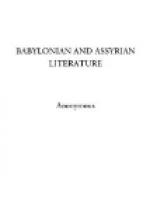He looks across the fields; the river glows
And winds beside taprani-trees, and flows
By teberinth and groves of tarpikhi
And ku-trees; curving round green mez-kha-i,
Through beds of flowers, that kiss its waves and spring
Luxuriant,—with songs the groves far ring.
Now thinking of the ship, he turns his eyes,
Toward the fountain,—springs up with surprise!
“’Tis he! the boatman comes! Ur-Hea
comes!
And, oh! at last, I’ll reach the glistening
domes
Of Khasisadra’s palaces,—at last
My feet shall rest,—upon that land be placed.”
And now Ur-Hea nearer makes his way,
And Izdubar addressing him, doth say:
“Ur-Hea is thy name? from yonder sea
Thou comest, from the seer across the way?”
“Thou speakest truth, great Sar, what wouldst
thou have?”
“How shall I Khasisadra reach? The grave
He hath escaped, Immortal lives beyond,
For I to him upon my way am bound;
Shall I the waters cross or take my way
Through yon wide desert, for I start this day?”
“Across the sea we go, for I with thee
Return to him,—I know the winding way.
Thine axe of bronze with precious stones inlaid
With mine, we’ll use beneath the pine-trees’
shade.”
And now, within the grove a ship they made,
Complete and strong as wise Ur-Hea bade.
They fell the pines five gar in length, and
hew
The timbers square, and soon construct a new
And buoyant vessel, firmly fixed the mast,
And tackling, sails, and oars make taut and fast.
Thus built, toward the sea they push its prow,
Equipped complete, provisioned, launch it now.
An altar next they raise and thus invoke
The gods, their evil-workings to revoke:
“[1]O Lord of Charms, Illustrious! who gives
Life to the Dead, the Merciful who lives,
And grants to hostile gods of Heaven return,
To homage render, worship thee, and learn
Obedience! Thou who didst create mankind
In tenderness, thy love round us, oh, wind!
The Merciful, the God with whom is Life,
Establish us, O Lord, in darkest strife.
O never may thy truth forgotten be,
May Accad’s race forever worship thee.”
One month and fifteen days upon the sea,
Thus far the voyagers are on their way;
Now black before them lies a barren shore,
O’ertopped with frowning cliffs, whence comes
a roar
Of some dread fury of the elements
That shakes the air and sweeping wrath foments
O’er winds and seas.
And see! a yawning cave,
There opens vast into a void dislave,
Where fremed shadows ride the hueless waves.
Dread Ninazu whose deathless fury craves
For hapless victims lashes with a roar
The mighty seas upon that awful shore.
The Fiends of Darkness gathered lie in wait,
With Mammitu, the goddess of fierce hate,
And Gibil[2] with his spells, and Nibiru[3]
The twin-god of black Fate, and grim Nusku[4]
The keeper of red thunders, and Urbat[5]
The dog of Death, and fiend of Queen Belat;[6]
And Nuk-khu, and the black-browed Ed-hutu[7]
The gods of darkness here with Tsi-lat-tu.[8]




